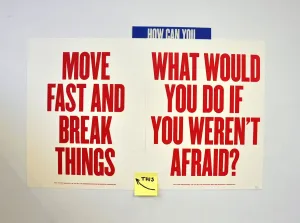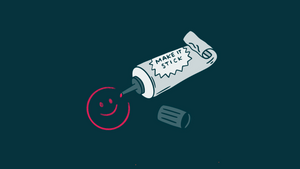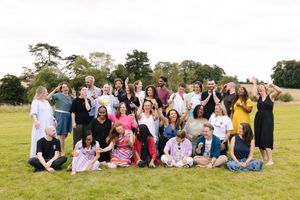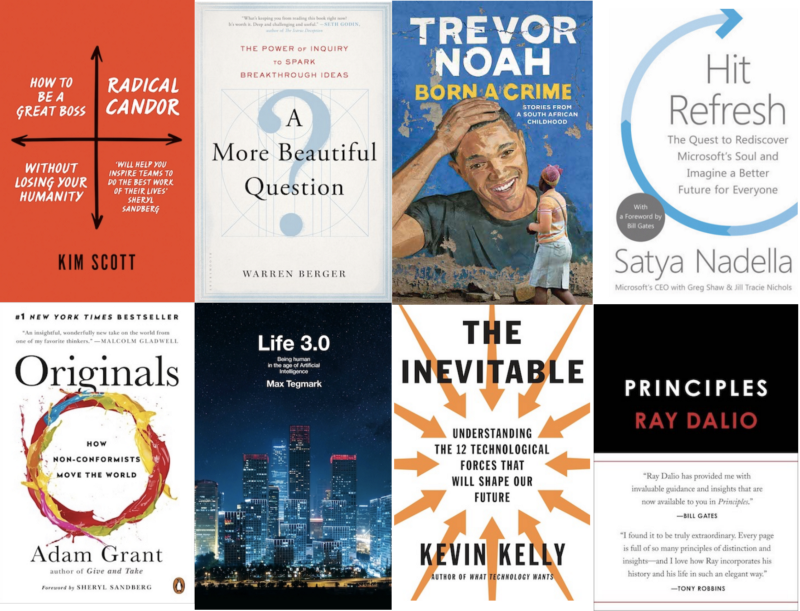
It’s barely comprehensible to think that this time last year 45 wasn’t yet sworn in, #metoo wasn’t a thing, the UK election wasn’t on the cards and Brink was just a glimmer in the eyes of Lea Simpson and I.
Naturally, the two of us read a fair amount in order to make sense of it all — and this year, of all years, gave us much to make sense of, including the work and contribution we wanted our new practise to make in the world.
These are the books that have helped us form points of view in uncertainty and entertained our intrigue about all things psychology, tech, business, impact, returns and the future.
These aren’t the most important books published in 2017, but the books that were most important to us in 2017.
You’ll see a big mix of some old favourites in there, like Long Walk to Freedom, along with others that are hot off the press. They’re clustered around the 6 conversations we kept having with collaborators, clients and each other on…
- Rethinking organisations for the future
- Understanding psychology to create change
- The practise of Innovation Mindsetting and the skills we need to do it (i.e. listening, learning, building, sharing)
- Designing better teams and employee experiences
- Man and machine
- Identity, politics, identity politics and making change
1. On rethinking organisations for the future
Abi: I spent 2017 reading an MSc in Organisational Psychology, spurred on by everything ‘future of work’ I saw coming down the line. As I researched and spoke with organisations successfully navigating change and uncertainty, I was struck by their different takes on the same recurring themes, like they each had a clear vision and were able to align teams’ purpose with that vision; they built up psychological safety as a basic condition for teams to thrive.
But there was something larger. I realised these organisations are truly putting their employees first, before product and even profit. They design their businesses well. They create exceptional cultures which empower employees. By surrounding teams with enabling structures, they thrive and so does business, as you’ll see from the accounts of 3 CEOs (Ray Dalio, Satya Nadella, Yvon Choinard) across 3 completely different industries.
Laloux’s book moves us towards a ‘Teal Organization’ model of fully autonomous teams which self-organise around an ever-evolving company purpose. It’s idealistic. Yet there’s truth and power in so much of his thinking. He explains the goal of Teal isn’t to make everyone equal, it’s to make everyone fully powerful. With recent events caused by the power imbalances deeply entrenched in industry (#metoo ring any bells??) I think we all recognise the need for more of that.

Principles. Ray Dalio. How Bridgewater Capital’s mindset and culture helped it become the world’s largest and best-performing hedge fund
Hit Refresh, Satya Nadella. About Microsoft’s resilience and shifting the company mindset for its next chapter
Let my people go surfing, including 10 more years of business unusual, Yvon Chouinard. The accidental entrepreneur’s guide to building a fully sustainable business with puts passion and planet before profit
Work Rules, Lazlo Bock. Insights from inside Google that will transform how you live
Reinventing Organizations, Frederic Laloux. A guide to creating organizations inspired by the next stage in human consciousness
2. On understanding psychology to create change
Abi: Innovation is widely understood as bringing ideas to market and there are endless business books on the processes and methods for doing this. But they so often neglect the real challenges for innovators we witness in our work: the messy, human side. The personal risks and rejection that innovators face as they stand up for their idea. Nurturing an idea, speaking truth to power, changing hearts and minds and building consensus requires an understanding of others and even more so of ourselves which these books tackle brilliantly.

Originals, Adam Grant. How non-conformists change the world by standing up for their ideas
The Four Tendencies, Gretchen Rubin. The distinction between how people tend to respond to inner or outer expectations and what it reveals about you turns out to be very important
Quiet: The Power of Introverts in a World That Can’t Stop Talking. Charting the rise of the extrovert and what we lose by undervaluing introverts and all their innovative, creative and collaborative qualities
Mindset. Carol Dweck’s 2017 update. It’s not just our abilities and talents which dictate our success, it’s the mindset we approach them with that creates standout performance and achievement
Insight: The Power of Self-Awareness in a Self-Deluded World, Tasha Eurich. Why we’re not as self-aware as we think, and how seeing ourselves clearly helps us succeed in work and life.
3. On the practise of Innovation Mindsetting and the skills we need to do it (i.e. listening, learning, building, sharing)
Lea: I had an innovation coach who used to say that doing innovative work was like stumbling into the mist. She was right. And when you stumble into the mist it’s your ego, sense of self, humility, ability to actively learn and listen that can make or break your work. This year, we’ve read and listened to a lot of wonderful work that has informed our view on Innovation Mindsetting as a practise. Here are some of the titles that have helped us shape our emerging and evolving view.
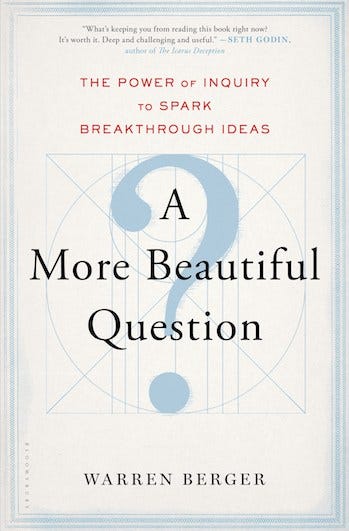
A More Beautiful Question, Warren Berger Insights from an innovation expert and journalist into using better questioning as one of the most powerful forces for igniting change in business and our daily lives.
Nonviolent Communication, A language of life. Marshall. B. Rosenberg A powerful consciousness and vocabulary to create change and help you get what you want peacefully
The road to Character, David Brooks Achieving greater success with selflessness
Lea: This year I wrapped up all the work we’ve been doing on mindsetting into a talk that had its debut at Service Experience Design in San Francisco — you can watch the talk here.
As part of the preparation, we created a set of Mindsetting Cards that we worked through over dinner with a group of nominated innovation leaders. If you’d like to use the cards to explore your own team’s mindsets and think about how you might improve the way you listen, build, share and learn together, a beta version of the cards are available to download here.
4. On designing better teams and employee experiences:
Abi: Design has come of age and become a mainstream practice for business. We have all the techniques we could wish for to design products and services and to sell them to the customer, from design-thinking and human-centred design to UX and UI. Yet we spend so little time applying those same techniques to ourselves at work, to our teams and our interactions with each other.
We believe it’s time for employees to think beyond superficial perks and incentives, to design teams with shared values and a safe environment in which those teams can challenge each other well. We’re excited about the potential for future-thinking organisations to design better employee experiences and these are just a few of the ideas that are informing our work
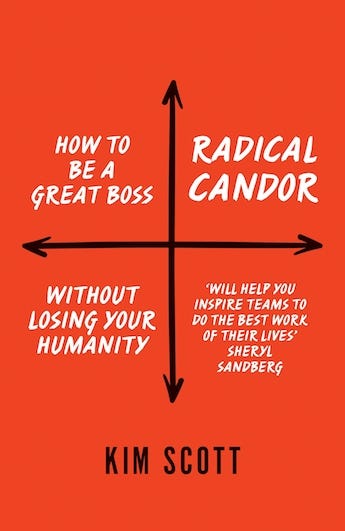
Radical Candor, Kim Scott. How to get what you want by saying what you mean kindly and with care. “Challenge directly. Care personally.” A fitting mantra for collaborations in 2018.
Teaming: How Organizations Learn, Innovate, and Compete in the Knowledge Economy, Amy Edmondson. How leaders can make organisational learning happen by building teams that learn.
The Power of Moments, Chip & Dan Heath. How to create moments with extraordinary impact
5. On man and machine
Lea: I’ve never really subscribed to the dystopian views of AI, but there’s a perspective portrayed in Homo Deus that has woven itself into me, impossible to shake. Harari suggests that for a useful proxy on how an advanced AI might treat humans, we simply need to look at how humans treat creatures that we outsmart. A chilling analogy — with the added side effect of tipping me closer towards vegetarianism.
I’ve also included an episode of Sam Harris’ truly wonderful podcast Waking Up. The episode with Tristan Harris is, I believe, vital listening. Tristan’s work might be some of the most culturally significant of this generation and has really led me to think about how we might change the business model of media to undo the most profoundly damaging dark patterns of all: those that war for our attention.
As a side note, Sam Harris has been an utter beacon of rationality and critical thinking this year, we love his podcast and highly recommend getting stuck in.
Abi: I have to say I agree — I’m a tech optimist but this year I started to really feel the darker side of our interface with technology. From our realisations just how much opaque algorithms are permeating our politics and society, allowing fake news to weaponise the web, to more people suffering ill mental health than ever before from smartphone and social media addiction. Meanwhile the tech revolution continues — Softbank has raised the largest ever technology investment fund of $93bn that will bet on the integration of computers and humans, and The Big Four (Amazon, Facebook, Apple, Google) grow apace and pretty much unchecked.
Our titles on man and machine begin to unpack how this has come about and where we go from here. I found their arguments more nuanced and insightful than much of the dystopian / utopian clickbait we’re seeing around. The authors’ views of what’s coming next are hugely thought-provoking, with perhaps the biggest provocation of all being that Kevin Kelly is calling the trends inevitable.

The Inevitable: Understanding the 12 Technological Forces That Will Shape Our Future, Kevin Kelly
Radical Technologies: The Design of Everyday Life, Adam Greenfield
The Four. Scott Galloway. How have they infiltrated our lives so completely they are almost impossible to avoid or boycott, and where do we go from here.
Tristan Harris on Sam Harris’ Waking Up Podcast
6. On identity, politics, identity politics and making change
Lea: As a South African I’ve found both of these works incredibly moving and profoundly, sadly timeless. During apartheid the people were broken down into smaller groups, divided and conquered. In Long Walk to Freedom, Nelson Mandela tells the story of his journey from holding protectively to people with whom he shared an identity to ultimately representing all of those with whom he shared values — and indeed how this was the only way to rewrite the script in South Africa. At a time when many of the left feel bruised by the blows of Brexit and Trump, these works are a timely reminder that when we are at our most battered and our instinct is to hunker and huddle with those who share our identity, these are the moments when we must do the opposite. We must find those with whom we share values, connect, convene and collaborate even if at first they feel like ‘The Other’.
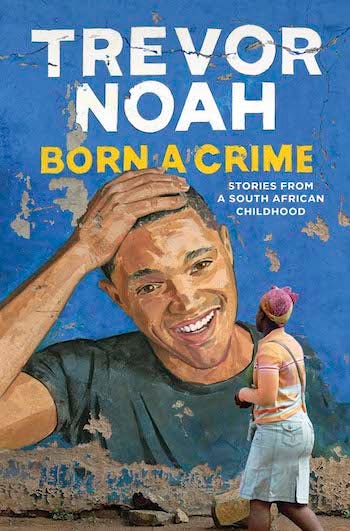
On our reading list for the new year.
There’s already a growing list for next year, what else should we be reading in 2018?

Exponential organizations, Salim Ismail
Capitalism without Capital: The Rise of the Intangible Economy, Stian Westlake & Jonathan Haskel
Counterclockwise: A Proven Way to Think Yourself Younger and Healthier
